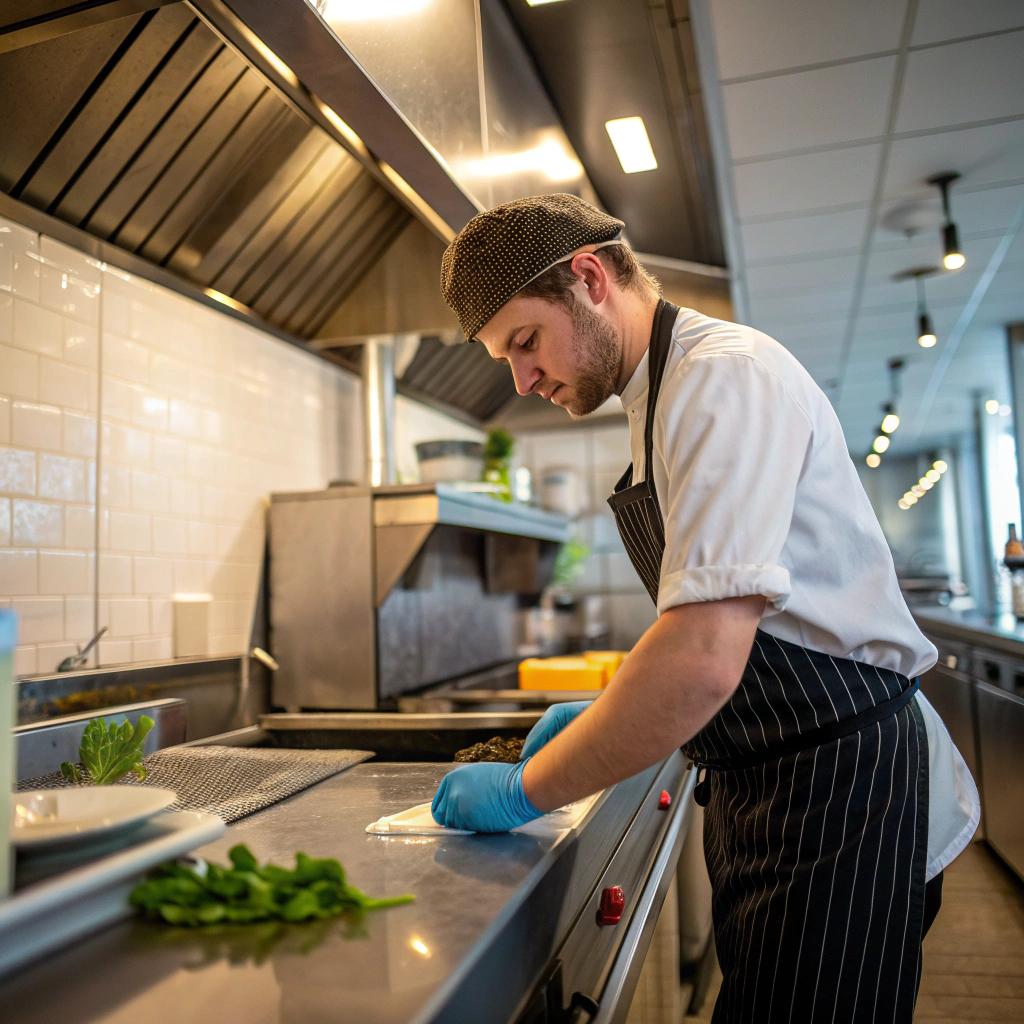Restaurants put a lot of effort into their kitchens, but keeping things spotless is a challenge. Not just for health codes, but for practical reasons. Ingredients touch almost every surface. Splatters, crumbs, grease—they build up, sometimes within hours. Chefs tend to be focused on food, and while some love scrubbing, many don’t (ask anyone who has worked in a kitchen). This is where house cleaning Chelmsford come in. They fill a gap most kitchens have: cleaning that goes deeper, further, and more often than staff usually manage.
How Professional Cleaners Work in Restaurant Kitchens
Cleaning in a restaurant is not a quick once-over at the end of the night. There are regulations, regular inspections, and honest concerns about customer health. So, professional cleaners do more than just wipe counters.
They break down cleaning into specific routines. I once saw a cleaning team come in right as the kitchen finished up a wild Friday night. They started with prep tables, moved quickly to behind appliances (some of the chefs had pulled out the fryers for them in advance), then spent ages on floors and drains.
Cleaners in Chelmsford tend to focus on:
- High-touch surfaces (think doors, handles, and fridge seals)
- Hidden spots like behind ovens and under shelving
- Grease traps (the bit almost nobody wants to touch)
- Floors, mats, and walk-in freezers
- Vent hoods and filters
“Professional cleaners look beyond the obvious. They clean places that chefs and servers rarely notice, but inspectors always find.”
What stands out to me is the checklist mentality. It is methodical. Wipe, rinse, sanitize. Then check it off, repeat. Few restaurant staff could keep up with that every day.
Meeting Standards and Following Regulations
UK food safety laws (and Chelmsford is no exception) ask for strict hygiene standards. It’s not optional. There are surprise inspections, written logs, and plenty of paperwork.
Some cleaners Chelmsford services keep their own logs. Others write in the restaurant diary, tracking each deep clean. Surfaces get special attention. Cross-contamination is a big deal, especially when it comes to allergens—think nuts, dairy, or gluten. Professional cleaners know which chemicals to use and which to avoid around food.
One thing I have heard more than once from restaurant owners is how grateful they feel when their cleaning team spots a maintenance issue before anyone else (a slow drain, or a cracked tile). These seem trivial, but inspectors notice.
“Consistent cleaning routines protect not only the guests but also the staff. Fewer slip hazards, less mold, and lower chances of pest problems.”
It is never just about aesthetics. Cleaners have a direct impact on the safety of both meals and workspaces.
What Gets Cleaned During a Deep Clean?
Daily cleaning is different from a scheduled deep clean. Most restaurants try for a major clean after busy periods. In Chelmsford, that often means late weekends or just after big holidays.
A basic breakdown of what a deep cleaning session looks like is below.
| Area | Tasks |
|---|---|
| Cooking Surfaces | Scrub burners, griddles, oven walls, fryer exteriors |
| Floors & Mats | De-grease tiles, clean drains, sanitize mats |
| Refrigeration | Wipe down shelves, seals, handles |
| Vents & Hoods | Remove filters, degrease, vacuum out dust |
| Food Storage | Disinfect bins, sanitize shelving, check for expired stock |
| Small Equipment | Deep clean slicers, mixers, microwaves |
This table might seem a bit simple, but a real deep clean feels like an operation. Staff often help with moving heavy things out of the way, but cleaners run the show. I once watched a cleaning crew find a lost kitchen knife behind a freezer. It had probably been missing for months.
How Cleanliness Affects Food Quality
People interested in cooking sometimes ask if professional cleaning really changes the taste or safety of food. The short answer: yes, indirectly.
Oils and crumbs hide in corners, they carbonize or attract insects. Burn marks on burners can smell, infused with old fat from days or weeks of cooking. Deep cleaning removes these, making for a fresher, safer meal.
“Even the most talented chef struggles in a dirty kitchen. Cleaners help set the standard for what is possible in terms of both food quality and safety.”
Clean utensils, prep boards, and equipment mean fewer mistakes. Allergen contamination drops. The risk of food poisoning falls. Even a few days without a proper cleaning routine can be obvious to trained eyes (and noses).
Why Most Cooks Can’t Do This Alone
It sounds harsh, maybe, but kitchen teams have other priorities. Chefs want to impress guests, keep up with orders, manage deliveries, and watch the clock. Cleaning takes time, effort, and training. The difference between a quick scrub and a real clean is hard to overstate.
Some restaurants do expect cooks to handle end-of-night cleaning. Mopping, surface wipes, putting equipment away. But that rarely compares to a specialist’s work.
Professional cleaners bring:
- Special tools (like long brushes and floor scrubbers)
- Industrial-grade cleaning products
- Experience with local regulations and standards
- Fresh eyes—a tendency to spot things regular staff miss
I remember being surprised by how quickly a cleaning team found small spills and patches of mold nobody else had noticed. One person’s “clean enough” is not another’s, especially in a restaurant context.
How Often Are Cleaners Needed?
This depends on the volume of business, kitchen size, and what the head chef expects. Some smaller restaurants use cleaning services once a week. Big places might need two or three sessions, especially around weekends.
Here is a rough schedule:
| Frequency | Type of Clean | Areas Focused |
|---|---|---|
| Daily (by staff) | Basic Clean | Counters, utensils, floors, sinks |
| Weekly | Professional Clean | All surfaces, hard-to-reach areas, equipment |
| Monthly/Quarterly | Deep Clean | Behind equipment, vents, ceiling, drains |
Some places probably lag behind this. Not every business manages to do everything by the book. But, if customers saw what kitchens looked like before and after a deep clean, they would probably worry less about eating out.
Reducing Stress for Restaurant Owners and Staff
I have spoken to restaurant managers in Chelmsford who say hiring professional cleaners is less about appearances and more about peace of mind. Trust is a big deal here.
Staff know that certain risks are being handled. Owners can focus on running the service, not scrubbing floors late at night. If an inspection happens, the team feels better prepared. There is less last-minute panic.
Some staff even pick up cleaning tricks from the professionals—product recommendations, or smarter ways to organize equipment. It can be humbling to realize how much you do not know about truly cleaning a kitchen.
Working With Cleaning Services in Chelmsford
If you are cooking at home, you get to decide how clean is clean enough. In a professional space, that choice is gone. Regulations, customer expectations, allergies—all make cleaning a priority.
Hiring local cleaners helps in more ways than just convenience. Companies in Chelmsford are familiar with the most common problems (like lime scale, common pests, or grease build-up from local water and ingredients). This can be a real advantage. Some cleaning services even send the same teams each time, which means they get to know your kitchen better and better.
A few questions restaurant managers often ask before hiring a cleaning team:
- What products do they use—and are any of them unsafe for kitchens?
- What experience do they have with kitchens of this size?
- Do they follow food safety laws and keep their own logs?
- Do they provide emergency cleans if something goes wrong?
Some of these questions sound obvious, but I have seen places skip asking and regret it later.
How Cleaners Handle Special Requirements
All kitchens are unique. Some are modern, full of stainless steel. Others are cramped or old with hard-to-reach corners. Allergens, deep fryers, special ovens—each needs a slightly different approach.
I heard about one Chelmsford kitchen that needed a team to clean wood-fired pizza ovens without using chemicals. Another had a serious problem with sugar ants, and the cleaning crew had to focus on sealing and sanitizing sweet storage areas.
The important thing is that not every cleaner or cleaning service is cut out for restaurants. Some specialize in offices, hotels, or homes. Restaurant kitchens really are a test—in speed, depth, and attention to detail.
Common Problems That Cleaners Help Solve
Here are just a few frequent issues that come up in restaurants:
- Unusual odors from forgotten spills or drains
- Grease stains on ceilings and walls
- Food debris behind fridges or under prep tables
- Pests (flies, ants, sometimes rodents)
- Crusty deposits on vent hoods or filters
- Mold in poorly ventilated areas
Cleaners usually have products and approaches most kitchen staff lack. Some use steam cleaners for stubborn areas. Others rely on old-fashioned scrubbing. It depends on what they find.
The Hidden Value of Outside Cleaners
There are many parts of restaurant cleaning that customers will never notice directly. And yet, the moment a place slips—when you spot a greasy handle, or crumbs collecting in corners—the impression lingers.
If you work in food, paying for outside cleaners is, perhaps, not a luxury but a basic part of running a safe kitchen. Maybe there are chefs out there who really do love scrubbing kitchen floors at two in the morning, but I have never met one.
Some people might consider hiring professionals as giving up some control, but it is about drawing on expertise. Cleaners have seen more kitchens than most chefs. They know the patterns, the problems, and the solutions.
Is Professional Cleaning Worth the Cost?
Costs are rising for everything in the food world. Sometimes it feels tempting to skip hiring a cleaner and try to manage with in-house staff.
But is it worth the stress? What happens if the health inspector comes on a Wednesday after a bank holiday, and your kitchen is not ready? What if staff get ill or busy, and cleaning slips down the list?
Looking at it another way: some kitchens clean “well enough” and get by. Others go for spotless, using both staff and professionals, and stand out over time.
Restaurants in Chelmsford, and everywhere else, still live or die by word of mouth, reviews, and customer confidence. Cleanliness is not really about shiny counters. It sits under everything: food safety, staff morale, long-term reputation.
So, is it worth hiring a company like cleaners Chelmsford? Maybe the better question is: how much risk are you willing to take in your own kitchen?
If you run a restaurant, what cleaning challenge has surprised you most, and how did you handle it?













